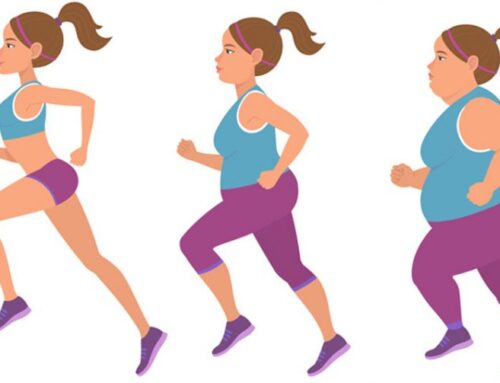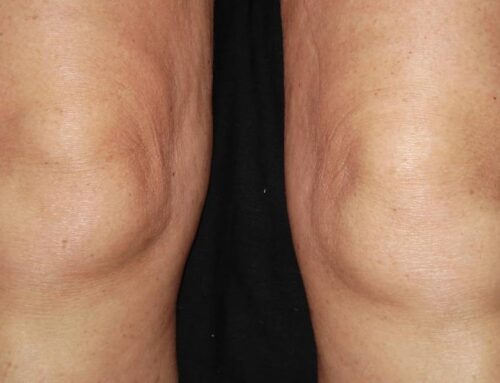Forget fads and gimmicks. A dietitian shares what she knows for sure about lasting weight-loss success.
The latest stats show that more than 70 percent of Americans are overweight or obese, and while many regain that weight, an important study that tracked successful dieters via the National Weight Control Registry found that over a ten-year period, the majority kept it off. I’ve spent much of the last two decades helping people on their weight-loss journey, and through my endless hours of research and writing, plus one-on-one coaching, I’ve picked up some important insight and great tips. Let me share them with you!
1. Forget What You Know About Calorie Math
I’ve spent much of my career talking about the calories in vs. calories out equation but I now know that you can’t rely on this paradigm. Instead, what the science shows is that as people lose weight, their metabolism changes so the calorie rule doesn’t hold up. This cool online tool is based on that research, and shows you how you would need to adjust your calories over time in order to maintain the weight you lost.
The other thing I’ve learned about calories is that there are plenty of high-calorie foods that can help a dieter out. For instance, there is good evidence that the Mediterranean diet, with unrestricted nuts and olive oil, can lead to improvements in body weight over a five-year period compared with a low-fat regimen. And while nuts themselves are high in calories and fat, studies show that they are helpful with weight loss. Importantly, nuts taste good — even indulgent — so including them on your menu may help you stick with it.
2. Eat More Veggies
The one thing all diets have in common is veggies, and if you want to lose weight, you should start eating more of them. You may say, as many have said to me, that you hate vegetables, but I challenge that assumption. In my view, you just haven’t found ways to enjoy them yet! If you grew up rejecting steamed broccoli, perhaps broccoli roasted with garlic and olive oil might be more enticing. Or maybe you’d like to try riced cauliflower in place of grain with your favorite stir-fry. If you can’t live without pasta, maybe you’d consider blending spaghetti or linguini with spiralized veggie noodles. (You can buy the pre-spiralized noodles in many supermarkets if you don’t want to invest in the gadget.)
Why You Should Eat More Protein at Breakfast
I’m not saying you need to eat like a rabbit — munching on carrot and celery sticks. You don’t. Instead, try new ways to cook veggies or experiment with fresh, filling, and seriously delicious salad combos. The key is to keep exploring the wide world of veggies until you find ways to enjoy them every day.

3. Don’t Be Afraid of Carbs
Sure, a low-carb plan can help you lose weight, but plenty of research also supports carbohydrates — even whole grain wheat — for slimming down. One recent study comparing grain avoiders to grain eaters found that the people who ate grains were less likely to be overweight or obese, and had a lower risk of metabolic complications, like type 2 diabetes. By contrast, avoiding grains was linked with a higher BMI and waist circumference, despite the fact that it was also linked with consuming fewer calories.
Another recent study showed that people who eat whole grains burned close to 100 more calories per day compared to people consuming similar calories but eating refined grains instead.
What I’ve learned is that you don’t need to take an all-or-nothing approach to grains. Most often, I consider grains a side dish rather than an entrée, but I still eat them every day. What is important is that you consistently choose whole grains over their refined counterparts. That means eating brown rice instead of white, whole grain bread over the pillowy, white sandwich bread you may have grown up loving, and choosing whole grain cereals, whether cold or hot, over hyper-processed refined versions.
4. Don’t Attempt to Out-Exercise a Bad Diet
Exercise has many benefits, and everyone needs to do it, but the truth is, your workout routine may not be helping you slim down, and even worse, it may be stalling your weight loss. There are a few things at play here. First, we tend to drastically overestimate how many calories we burn while exercising, particularly if we’re doing something intense, like spinning or running. Even our high-tech watches and other devices can overestimate the calories we’ve spent working out. That can lead to the reward mentality. Put another way, it’s that voice in your head that tells you, “You can have that cookie, you worked your butt off during spin!” Personally, I’ve never given myself permission to go for it (pizza! ice cream!) as often as when I was training for a half marathon. And though I was logging more than 30 miles in weekly runs, I put on a noticeable amount of weight. 9 things a registered dietitian wants you to know about weight loss
Women, in particular, tend to eat what we expend in exercise, according to research on the matter. In plain terms, our bodies are well-regulated to know when we’ve done a session of HIIT or spent time on the elliptical. Unknowingly, we put a little more food on our plates or have a heftier snack in order to replenish what we burned off.
Other notable research found that for those new to exercise or those exercising less frequently, there may be a slight impact on energy expenditure, meaning it might provide a small (but meaningful) drop on the scale. But here’s the bad news: Workouts among people doing the most exercise didn’t show up on the scale. They likely experience other benefits — improved mental health, lower risk of heart disease, for instance — but they don’t have an edge when it comes to weight loss.
I’m not saying you should take a lifelong pass on fitness in order to slim down. What I am saying is that if you’re killing it on the cardio machine merely to burn calories and squeeze into your extra-skinny skinny jeans, you may need to re-think this strategy. When it comes to losing weight, it’s more about what you put in than what you’re burning off. Among participants in the Weight Control Registry, walking is the most frequent form of exercise, and there was no difference in weight maintenance after three years among people who participated in the most physical activity compared to those exercising the least. 9 things a registered dietitian wants you to know about weight loss
5. Make Peace with the Scale
For most people, I recommend weighing yourself often — even daily, and no less frequently than once a week. Your scale provides great data points, allowing you to recognize when you’re trending in the wrong direction. At that point — let’s call it the 5-pound mark — it’s time to analyze where you may have gotten too relaxed. Have you eaten out more frequently? Are you skimping on the veggies? Perhaps you’ve had a few extra causes for celebration lately. Whatever the case, once you’ve noticed that you’ve put on 5 pounds, it’s time to take action. You don’t need an expert to recognize that it’s easier to lose 5 pounds than it is to lose 10 or 20.
6. Redefine Your Ideal Weight
When I’m meeting with clients, I not only ask what their goal weight is, but when was the last time they were at that weight. If the answer dates back to the first time shoulder pads were in fashion, it’s time to rethink the ideal. You get massive benefits, like reducing the risk of type 2 diabetes and heart disease, by losing just 5 percent of your weight, according to research. Consider aiming for this goal, and when you achieve it, you can take it from there.
7. Be Prepared for Hard Work
Anyone who has lost weight, or even those who have maintained a healthy weight, knows that it takes some effort. But with time and practice, it becomes much easier. For those who have struggled with past attempts, I’ve found taking a micro-step approach works well. Start by setting mini goals, like adding a fruit or vegetable to your menu each day. With each success, take a moment to recognize your accomplishment. The satisfaction you gain from accomplishing these micro goals helps to strengthen your determination to tackle the next one. These mini successes add up over time and can lead to sustainable habits. 9 things a registered dietitian wants you to know about weight loss
8. If You Veer Off Course, Do an Immediate U-Turn
Tripping up — say, by ordering the plate of nachos at happy hour — is part of the journey. We all give in to the occasional indulgence. Where I’ve seen people go astray is to take that tiny slip and turn it into a massive binge. But I ask: If you took the wrong turn while driving, would you keep going? No! Nor would your GPS shame you for going in the wrong direction. Instead, the GPS provides a gentle reminder to get back on track. Take that mentality to your next food detour and remind yourself to do a u-turn at your next eating occasion.
9. Don’t Give Up — Even If It Seems Insurmountable
No matter how many times you’ve tried losing weight in the past, there is still hope. People who have successfully lost weight tend to continue to manage those behaviors and foods that got them there. In other words, they continue to practice.
WHAT A NUTRITIONIST WANTS YOU TO KNOW
- Bad nutrition advice dietitians want you to forget
- The best way to lose weight boils down to these three things
- What you need to know about going vegan
- What is healthier: natural sugar, table sugar or artificial sweeteners?
- The healthier pick: a hot dog or a hamburger?



